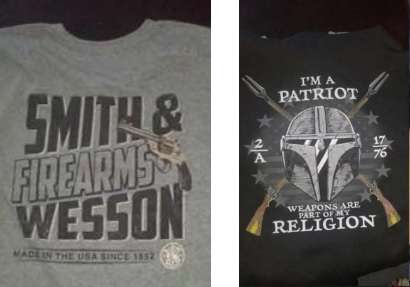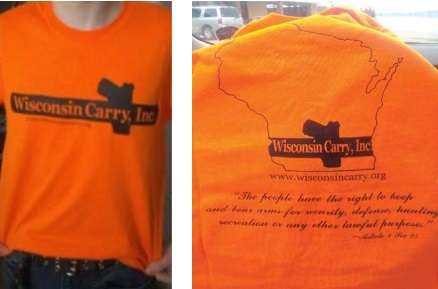The Volokh Conspiracy
Mostly law professors | Sometimes contrarian | Often libertarian | Always independent
Lawsuit Over Schools' Restriction on Pro-Gun Shirts Can Go Forward
N.J. v. Sonnabend, decided Friday by Judge William C. Griesbach (E.D. Wisc.) involved two students being told by their schools (Shattuck Middle School and Kettle Moraine High School) that they couldn't wear these T-shirts:


The districts claimed they should win as a matter of law, not on the grounds that the shirts caused some disruption, but on the grounds that the Wisconsin Carry shirt was just too orange they just weren't protected by the First Amendment:
Defendants contend that none of the shirts constitute protected speech primarily because the shirts fail to convey a particularized message, and because two of the shirts are "merely advertisements for companies that happen to have a picture of a firearm on them." …
No, said the court:
Clothing that bears explicit messages or symbols which are intended to convey a political or other message can clearly amount to speech entitling the wearer to First Amendment protection….
Defendants argue that in order for printed words or pictures on a shirt to receive constitutional protection, the message being conveyed must be clear and unmistakable. But that is not the law…. "[A] narrow, succinctly articulable message is not a condition of constitutional protection." If it was, the First Amendment "would never reach the unquestionably shielded painting of Jackson Pollock, music of Arnold Schöenberg, or Jabberwocky verse of Lewis Carroll."
Applying these principles to the pleadings in this case, the court concludes that each of the shirts at issue plausibly falls within the protection afforded by the First Amendment. Defendants argue that the Smith & Wesson shirt is not protected speech and is instead an advertisement for a company that just happens to contain a picture of a firearm. Because it is merely the name of a company with the image of a firearm on a shirt, they claim the shirt fails to convey any "particularized message," such that it would be entitled to protection by the First Amendment. N.J., for his part, argues that even if it is commercial speech, the shirt is still entitled to some constitutional protection.
Commercial speech is "speech that proposes a commercial transaction." In wearing his Smith & Wesson shirt to school, N.J. was not proposing a commercial transaction, at least according to the complaint. Plaintiffs allege in their complaint that each of them "believes in the value to society of personal possession of arms as guaranteed by the Second Amendment." … [Both the Smith & Wesson shirt and the I'm a Patriot Shirt] are intended to convey N.J.'s belief in the importance of the right to bear arms.
The same is true of the WCI shirt that A.L. sought to wear at the Kettle Morraine High School. Defendants argue that the WCI shirt is merely an advertisement, and that in any event, the shirt does not convey any particularized message. They contend that the court should not consider the text from the Wisconsin Constitution on the back of the shirt because it is not included in the description of the shirt set out in the complaint. It is well-established, however, that "documents attached to a motion to dismiss are considered part of the pleadings if they are referred to in the plaintiff's complaint and are central to his claim. Such documents may be considered by a district court in ruling on the motion to dismiss."
While not strictly speaking a "document," the WCI shirt is the equivalent and serves the same purpose in this case. The WCI shirt is referred to in A.L.'s complaint and is central to his claim. The court therefore considers the message of the entire shirt and not just the language and image of a handgun on the front of the shirt, though the front alone would appear to be constitutionally protected for the same reason as the message conveyed by the Smith & Wesson shirt.
Not only did Plaintiffs intend to convey a clear message in wearing their shirts, it also seems clear that school authorities understood the message Plaintiffs were intending to convey, at least to the extent their message included an appreciation for the right to own firearms. School officials are alleged to have told both N.J. and A.L. that they were prohibited from wearing the shirts because of their depiction of firearms. Based on the allegations of the complaint, it at least appears that the school officials' response to N.J.'s shirts was motivated by the very message N.J. sought to convey in a school setting.
Each of the shirts at issue is therefore entitled to constitutional protection. That protection, of course, is not absolute. Whether Defendants were justified in prohibiting Plaintiffs from conveying their messages in the manner and place chosen by them remains to be decided. Defendants' motion for judgment on the pleadings on the ground that the shirts lack constitutional protection, however, is denied….
Quite correct, I think. For more on K-12 student speech rights, see:
Editor's Note: We invite comments and request that they be civil and on-topic. We do not moderate or assume any responsibility for comments, which are owned by the readers who post them. Comments do not represent the views of Reason.com or Reason Foundation. We reserve the right to delete any comment for any reason at any time. Comments may only be edited within 5 minutes of posting. Report abuses.
Please to post comments


Makes me curious as to how many other t-shirts had "advertising" and were allowed. I'd bet far more than the school district would want to admit.
Unless high school has changed a lot, there's a lot of licensed clothing with sports teams on it. Curious what the "particularized message" of that is.
How many shirts have the name of the manufacture displayed on them, isn't that advertising?
The decision seems so ... obvious.
The difference between this and the bong hits case is that guns are legal, pot is not. Ought that not make a distinction???
Dr. Ed 2: Who is arguing that it oughtn't?
I don’t think it should. The First Amendment protects endorsing and advocating for illegal things. It would be a strange freedom of speech indeed that only protected speaking up for things that are already legal.
"The First Amendment protects endorsing and advocating for illegal things. "
And more precisely, the First Amendment protects advocating for a change in the law, no matter what the nature of that change. That would include advocating for legalizing recreational drugs.
MatthewSlyfield: The First Amendment indeed protects advocacy of legalizing recreational drugs. Indeed, that is likely why the majority in Morse v. Frederick was careful to note that, "this is plainly not a case about political debate over the criminalization of drug use or possession"; and why Justice Alito's concurrence, joined by Justice Kennedy stressed,
Given the number of high school shootings there have been, any shirt that conveys an "I'm a big gun enthusiast" message would strike me as threatening and therefore disruptive; the schools should have gone by that defense, succeed or fail, and not tried a rather stupid argument that this was not speech. Three out of four of those images suggest to me a political message; the Smith and Wesson advertisement is the only one that doesn't obviously do so.
It's only threatening to people with an exaggerated fear of guns.
Should we ban, say, jokes about drunks because someone, somewhere, had a drunk parent?
Jokes about hot rods because someone lost kith or kin to a car accident?
Jokes about tigers because someone lost a sibling to a tiger attack?
Once you get into the subjective, you turn rule of law into rule of men.
I should point out that I didn't say it would succeed, only that it would be a better argument.
If any of the things you listed were particularly well known for high school students to use to kill other high school students, then your argument might make sense.
How would you feel about a student's T-shirt that showed their personal kill list? Disruptive enough, I would think. Would you assume that they were planning to use a tiger or a hot rod or a drunk to carry that out?
Very few high school students kill each other with guns. Far more kill each other with cars. Do we ban the hot rod t-shirts?
That's a bad comparison. Guns and cars are both tools- but the primary purpose of a gun as a tool is to kill or injure living beings; the primary purpose of a car as a tool is to allow a place for teenagers to make ou... sorry, I mean as a mechanism of transportation.
I am not saying how these cases should come out. Under the precedents, they are close. But the school shooting angle is a relevant fact in the calculus of whether something like this is disruptive.
No, the primary purpose of a firearm is to project a bullet at a target. It's the user who determines the target. Just as a knife's primary purpose is to cut: you can slice bread or you can cut a throat, it's the human who makes that choice. The same argument you make about guns could be made about bows and arrows, or axes, or tire irons, yet I doubt any school district would ban t-shirts depicting them.
Indeed, the reasons listed for the 2nd Amendment involve deliberately shooting at and killing living things: hunting, self-defense, or defense against a government gone awry.
There may be misuses, but they cannot override this without amendment.
That is indeed a bad comparison. High school students do not threaten each other with cars; the deaths caused by cars are typically accidental. Nor would it be easy to bring a car into the classroom to kill other students.
Cars are used extensively for a variety of purposes without causing deaths. Outside threatening, injuring and killing, guns are used for hunting and competition (and I would probably be inclined to allow a hunting or biathlon related shirt, were I a high school administrator), but that seems a bit less so of handguns (Smith & Wesson seems more associated with handguns, but also made the gun used in several notorious mass shootings). And that's clearly not what the "patriot" T-shirt is about (shooting at people who are not "patriots") and concealed carry has nothing to do with hunting or competition.
More teenagers kill other teenagers with cars than with guns, so....
Given that, despite the media hype, schools are safer than pretty much anywhere else and that school shootings remain exceptionally rare, that might be less stupid than "it's not speech" but only very slightly.
I've always wondered how a school with an strong anti-gun stance would deal with a student wearing a t-shirt with an image of the Massachusetts state quarter on it.
If it weren’t political speech, it wouldn’t be disruptive.
Griesbach has done a good job with First Amendment cases. He held a technical college liable when it stopped a student from handing out religious-themed Valentines a couple years ago.
Thanks admin for giving such valuable information through your article . Your article is much more similar to https://www.fendioutletx.com/fendi-small-mon-tresor-bucket-bag-in-canvas-multicolor.html word unscramble tool because it also provides a lot of knowledge of vocabulary new words with its meanings.